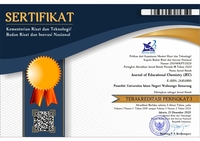Analysis of Students' Psychomotoric Abilities in Daily Life -Based Practicum on Reaction Rate Material
DOI:
https://doi.org/10.21580/jec.2024.6.2.21944Keywords:
daily life based practicum, psychomotor abilities, reaction rateAbstract
The aim of this research is to analyzing students' psychomotor abilities in daily life -based practicums on reaction rate material. This research was carried out in the 2022/2023 academic year at Madrasah Aliyah Negeri 1 Kampar with the material Reaction Rate. The method used in this research is quantitative descriptive. The instruments used in this research were performance assessment sheets to determine students' psychomotor abilities and interviews to strengthen the data obtained. The results of data analysis show that the average psychomotor ability of students is 79.19. The highest average score obtained was in the naturalization domain with the very good category and the psychomotor ability with the lowest average score obtained was in the precision domain with the good category. The psychomotor indicator with the highest average score is assembling experimental equipment in the very good category, and the psychomotor indicator with the lowest average score is the indicator for splitting and smoothing solid substances in the good category. The psychomotor abilities of the students are mostly in the good category, which is 52% with the highest rating scale score being scale 4 with a good category, which is 59%. Daily life -based chemistry practical learning can make it easier for students to carry out practical work.Downloads
References
Astuti, SW, Andayani, Y., Al-Idrus, SW, & Purwoko, AA (2019). Application of Practical Methods Based on Daily Life to the Science Process Skills of Class XI MIA MAN 1 Mataram Students. Chemistry Education Practice , 1 (2), 20.
Djulia, E., Hasruddin, & Arwita, W. (2020). Evaluation of Biology Learning (1 ed.). We Write Foundation.
Enawaty, E. (2020). Description of the Psychomotor Abilities of Chemistry Education Students in Acid-Base Titrations. AR-RAZI Scientific Journal , 8 (2), 91–101.
Gupitasari, DN, Sumarni, W., & Wardani, S. (2019). Development of Waste-Based Distillation Teaching Aids to Improve Students' Psychomotor Skills. Journal of Chemistry In Education , 1 (8), 1–7.
Isnaini, AI, & Utami, L. (2020). Development of a Performance Assessment Instrument to Measure Students' Psychomotor Abilities in Reaction Rate Practicum. Journal of The Indonesian Society of Integrated Chemistry , 12 (1), 24–30.
Juvitasari, PM, Melati, HA, & Lestari, I. (2018). Description of Knowledge of Chemical Practical Tools and Psychomotor Abilities of MAN 1 Pontianak Students. Equatorial Journal of Education and Learning , 7 (7), 1–13.
Kusumaningtyas, P., Yusvitasari, RE, & Majid, A. (2018). Development of a Performance Assessment Instrument to Measure Student Competency in Chemistry Practicum Activities in SMA/K. Journal of Innovation in Chemical Education , 12 (2), 2128–2136.
Mudhakiyah, Z., Wijayati, N., Haryani, S., & Nurhayati, S. (2022). Development of Instruments for Assessment of Students' Psychomotor Aspects in Chemistry Learning Practicum Reaction Rate Material. Journal uunes , 11 (2), 3.
Nurbaiti, Enawaty, E., & Sartika, RP (2018). Description of the Psychomotor Skills of FKIP Untan Chemistry Education Students in the Practicum for Determining Ascorbic Acid Levels. Equatorial Journal of Education and Learning , 7 (7), 1–11.
Sajeena, S. (2021). A Study on the Role of Green Chemistry in Daily Life of Secondary School Students. International Journal of Engineering Applied Sciences and Technology , 6 (3), 340–345.
Siagian, DP, & Yasthophi, A. (2021). Design and Testing of Everyday Life Phenomenon-Oriented Learning Media on Thermochemical Material. Journal of Chemical Education Research , 11 (2), 64–73.
Simanjuntak, FN, & Utama, OPA (2019). Chemistry Based Learning in Everyday Life to Balance the Impact of the Revolution Daily Life - Chemistry Based Learning to Balance the Impact of Industrial Revolution 4. 0. National Seminar on Chemistry Education , January , 1–6.
Siregar, RA (2018). Effectiveness of the Development of the Inquiry-Based Learning Model to Improve Students' Psychomotor Achievement. Journal of Physics: Conference Series , 1088 .
Supardi. (2015). Authentic Assessment of Affective, Cognitive, and Psychomotor Learning: Concepts and Applications (1 ed.). Rajawali Press.
Downloads
Published
How to Cite
Issue
Section
License
The copyright of the received article shall be assigned to the journal as the publisher of the journal. The intended copyright includes the right to publish the article in various forms (including reprints). The journal maintains the publishing rights to the published articles.
Authors are permitted to disseminate published articles by sharing the link/DOI of the article at the journal. Authors are allowed to use their articles for any legal purposes deemed necessary without written permission from the journal with an acknowledgment of initial publication to this journal.

This work is licensed under a Creative Commons Attribution-NonCommercial-ShareAlike 4.0 International License.


